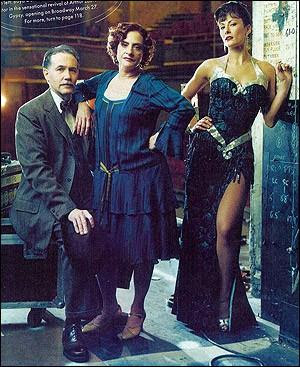Tessie O’Shea was a Welsh music hall performer who became immensely popular in the West End. Her signature song (capitalizing on her weight) was ‘Two Ton Tessie from Tennessee’, and henceforth was known affectionately to many fans as “Two Ton Tessie, ” a performer with an infectious smile, endless warmth and a clarion voice that could soar with the best of them. She made her Broadway debut in 1963 in the original cast of Noel Coward‘s final musical The Girl Who Came to Supper, which starred Jose Ferrer and Florence Henderson. Adapting Terrence Rattigan’s The Sleeping Prince, a play about an American chorus girl who arouses the desires of a Prince Regent during the coronation of George V in 1911 London, the production received negative notices for attempting to ape the highly successful My Fair Lady.
One the shows pros – and structurally, one of its cons – was creation of the role of Ada Cockle, a fish and chips peddler in the heart of London, for O’Shea, whose sole purpose was to deliver a 15 minute song cycle of music hall numbers (that ultimately didn’t advance plot or character)*. However, audiences and critics adored O’Shea and her song-cycle, and for those showstopping 15 minutes in the first act, she would receive the Tony award for Best Featured Actress in a Musical. The show itself couldn’t overcome the negative reviews and box-office drop-off (1963-64 was one of the richest seasons in the history of the American musical, with Hello, Dolly! as the toast of the town, and other memorable shows such as She Loves Me, High Spirits, 110 in the Shade and Funny Girl) and closed after 112 performances at the Broadway Theatre.
The score is rather pleasant. Typical of Coward with some operetta and pastiche materials and, as always, his witty lyrics. Ferrer acquits himself well for a poor singer. But it’s Henderson and O’Shea who get the best of the material. Henderson had two choice ballads, but also had a 10 minute showcase in the second act in which she delivered a one-woman abridgement of her character’s musical The Coconut Girl. (Much like “The London Medley” in the first act, “The Cocoanut Girl” was strictly peripheral to the story, but also brought down the house). I have a minor quibble about the latter: if Mary Morgan is so good that she can sing, dance and act the entire show by herself, then why isn’t she the star of the show, or at least the star’s understudy? But, it’s a minor quibble and a joy to hear Henderson take on the multi-octave send-up of period musicals.
O’Shea also appeared as the matriarch in the 1966 failure A Time for Singing, a sung-through musical adaptation of How Green Was My Valley. While a quick failure, the musical contained a magnificent and soaring musical score, thankfully recorded, albeit highlights. She got to lead several numbers, most notably the rousing title song. The show played 41 performances in 1966, and also starred Shani Wallis and, in his Broadway debut, George Hearn.
Many of you might recognize her from her appearances in the films Bedknobs and Broomsticks and The Russians Are Coming, The Russians Are Coming. Enjoy this entertaining lady at the top of her form.
PS – What the hell kind of accent was that, Ed?
